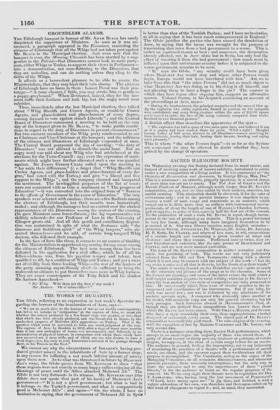GROUNDLESS ALARMS.
Tun Edinburgh banquet in honour of Mr. ADAM BLACK has sorely disquieted the supporters of Ministers. As soon as it was an- nounced, a paragraph appeared in the _Examiner, reminding the Citizens of Edinburgh that all the Whigs had not taken part against Mr. IlLsca in the Municipal election. And even now that the banquet is over, the Minming Chronicle has been startled by a sug- gestion in the Patriot—that Dissenters cannot look to mere party- men, either Whigs or Tories, to support their views in Parliament— , into a demonstration, not over-flattering to the Dissenters, that ' they are nobodies, and can do nothing unless they cling to the skirts of the Whigs.
It affbrds us a benevolent pleasure to be able to assure the
Ministerialists, that they.may hush their vain alarms. The citizeas of Edinburgh have no harm in them : honest Pistol was their pro- totype—" A tame cheater, r faith, you may stroke him as gently as a puppy-greyhound." When ill-treated, indeed, they for the mo- ment ruffle their feathers and look big, but the angry mood soon subsides.
Thus, immediately after the last Municipal election, they talked
about "Whig Sheriffs and Crown Agents, or would-be Crown Agents, and place-holders and place-hunters of every degree, coming forward to vote against stanch Liberals" ; and the Central Board of Dissenters summoned a meeting to be held on the very (14 of the banquet given to Mr. BLACK, " to make public resolu- tions in regard to the duty of Dissenters in present circumstances." But two eminent members of the Whig party condescended to act as Chairman and Vice-Chairman at the banquet ; and the sulkiness of the citizens and Dissenters of Edinburgh evaporated at once. The Central Board postponed the day of meeting " the duty of Dissenters" was not allowed to disturb the social hour. Not an angry word was said about any Whig who had misbehaved at the elections for the Town-Council : nay, even the expression of senti- ments which might have further alienated such a one was guarded against. Sir JAMES GIBSON CRAIG called upon the meeting to " lay aside their differences," (1. e. forget that "Whig SherifEs and Crown Agents, and place-holders and place-hunters of every de- gree," had voted with the Tories,) and give " a liberal and free support to the Whigs"; and the company cheered and buumered the sentiment. The bewhiggified preparers of the list of toasts were not contented ssith so trite a sentiment as " The progress of Education "—it was converted into the original form of " Success to the efforts if Government in the cause of Education." The very speakers were selected with caution : there are a few Radicals among the electors of Edinburgh, but their mouths were hermetically sealed ; and although the managers had no control over the clerical representative of the Dissenters among the orators of the evening, (he gave Ministers some home-thrusts,) the lay representative was skilfuly selected—for our Professor of Law in the University of Glasgow grows old. And all this gentle and conciliatory disposi- tion was maintained in spite of what the Scotsman calls " the timorous and fastidious spirit " of "the Whig lawyers," who ab- sented themselves—and we add, of certain long-tongued Whig doctors, who followed their example.
In the face of filets like these, it seems to us an excess of timidity
for the Ministerialists to apprehend any mutiny for any cause among the citizens of Edinburgh. The best man among them has laseo defeated in his application for a civil office, which he of all his fellow-citizens was, from his peculiar temper and talent, best
qualified to fill, by a coalition of Whip and Tories ; and yet a mere act of civility from three leading Wings—the rest of the leaders of the party standing superciliously aloof—is sufficient to bring the malecontent citizens to put themselves once more in Whig harness. They are exact counterparts of Sir Toby Belch and Ins shadow Sir Andrew Aguecheek-
" Sir Toby. Wilt thou set thy foot o' my neck ? Sir Andrew. Or o' mine either ? "


























 Previous page
Previous page